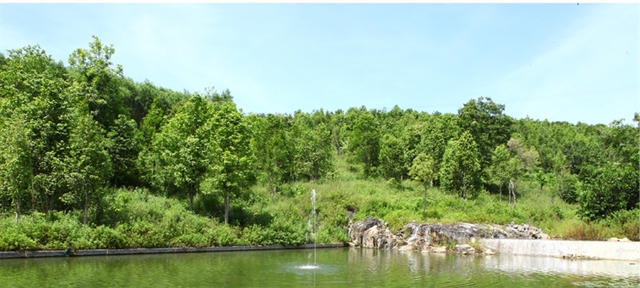 Sunday/Weekend
Sunday/Weekend

By Lương Thu Hương
Deep in China's southwestern Yunnan Province lies Xishuangbanna Prefecture, a land of natural beauty and cultural diversity. Here, ancient traditions of the indigenous Dai people coexist harmoniously with modern progress, offering a unique experience for all who visit.
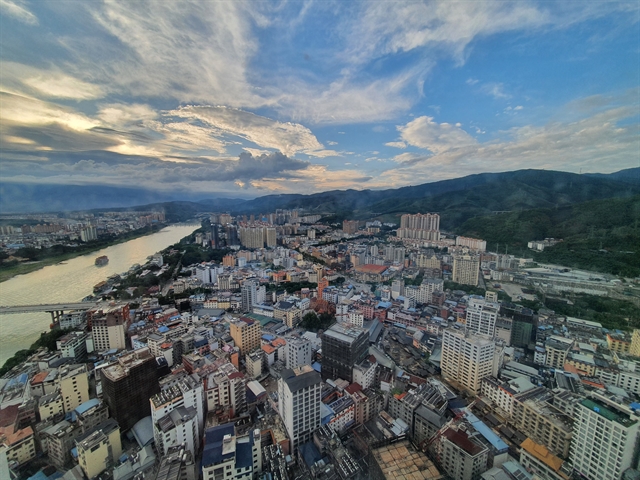 |
| CITYSCAPE: An aerial view of Jinghong, the capital city of Xishuangbanna. VNS Photo Lương Hương |
From Hà Nội, tourists can travel to the northern province of Lào Cai by train or bus, pass the border checkpoint into China, and then continue by bus or train to Xishuangbanna, an autonomous prefecture, bordering both Myanmar and Laos.
Alternatively, one can depart from Luang Prabang, Laos, and take the cross-border China-Laos high-speed train to Mohan, a town in Yunnan bordering Laos, and then catch another train to the prefecture.
Mankongdai Village
Xishuangbanna, home to over 1.3 million people, hosts 13 ethnic minority groups, with the Dai people forming the largest proportion.
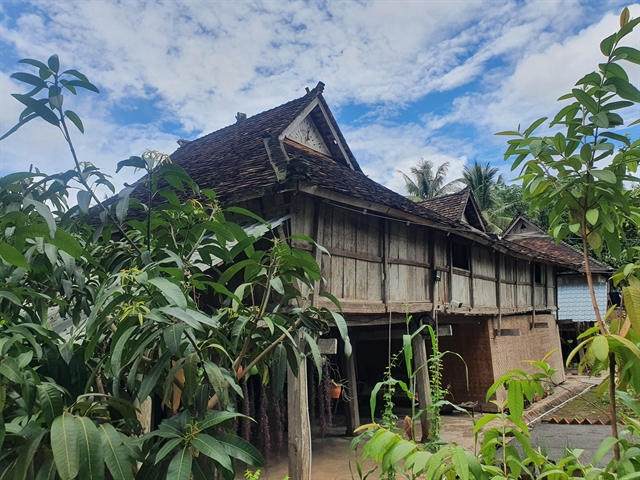 |
| BACK TO NATURE: The village still retains many ancient stilt houses. VNS Photo Lương Hương |
Mankongdai Village, one of the key destinations showcasing Dai cultural heritage, has a history of about 400 years and rich ethnic characteristics. The village has 65 households with 326 people, covering an area of 1.3 square kilometres, with 311 hectares of land suitable for planting tropical crops such as rubber, dragon fruit, pineapple, and pomelo.
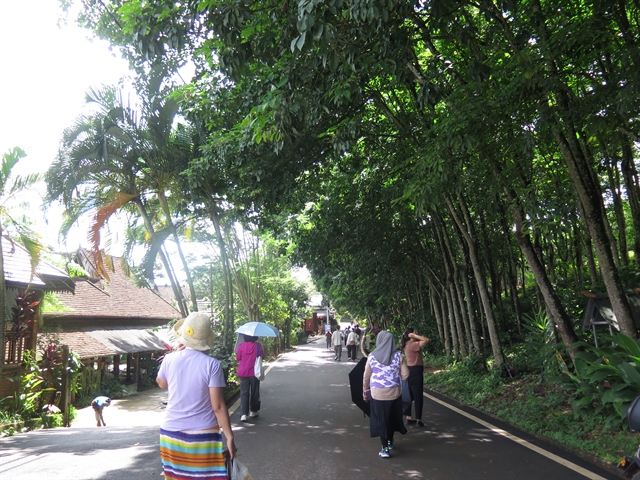 |
| SLEEPY ROADS: Mankongdai Village nestles among lush greenery. VNS Photo Lương Hương |
As I approached Mankongdai, the village's breathtaking natural beauty was immediately apparent. Traditional Dai stilted houses nestle among lush greenery, with fruit trees and blooming flowers enhancing the scenery. The village is known for its simplicity and tranquillity, preserved in its original ecological state.
According to the villagers, seven respected tribal chiefs settled in Mankongdai due to its flat terrain, beautiful scenery, and rich natural resources. Known as "Mankongnaman", meaning "the village that produces oil" in the Dai language, it was the first village in the area to have oil lamps. In the early days, villagers used the high-oil-content fruits from local trees to make oil.
Tourists visiting the village can immerse themselves in nature and Dai culture. The local houses feature traditional Dai architecture, and local women often wear vibrant, colourful sarongs.
The village boasts several intangible cultural heritage exhibition halls, showcasing traditional crafts such as silverware, handloom fabrics, pottery, and bamboo wickerwork. Visitors can even try their hand at pottery and take home their creations as souvenirs.
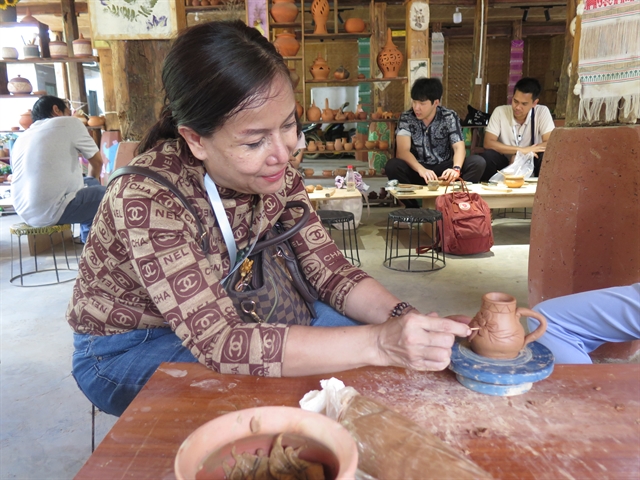 |
| CLAY TIME: A visitor is making a clay jar at Mankongdai Village. VNS Photo Lương Hương |
Another major attraction is the main streets adorned with brilliant, ethnic-themed murals, which serve as popular "check-in" spots for tourists and make for beautiful photo backdrops.
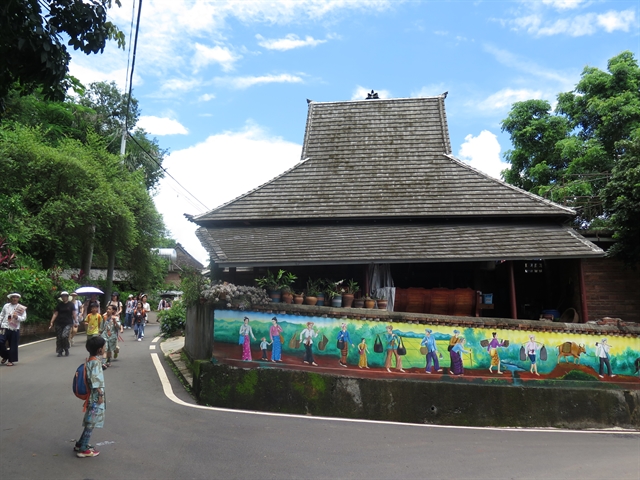 |
| The village's main street are adorned with brilliant, ethnic-themed murals, which serve as popular "check-in" spots for tourists. VNS Photo Lương Hương |
Dai Ethnic Garden
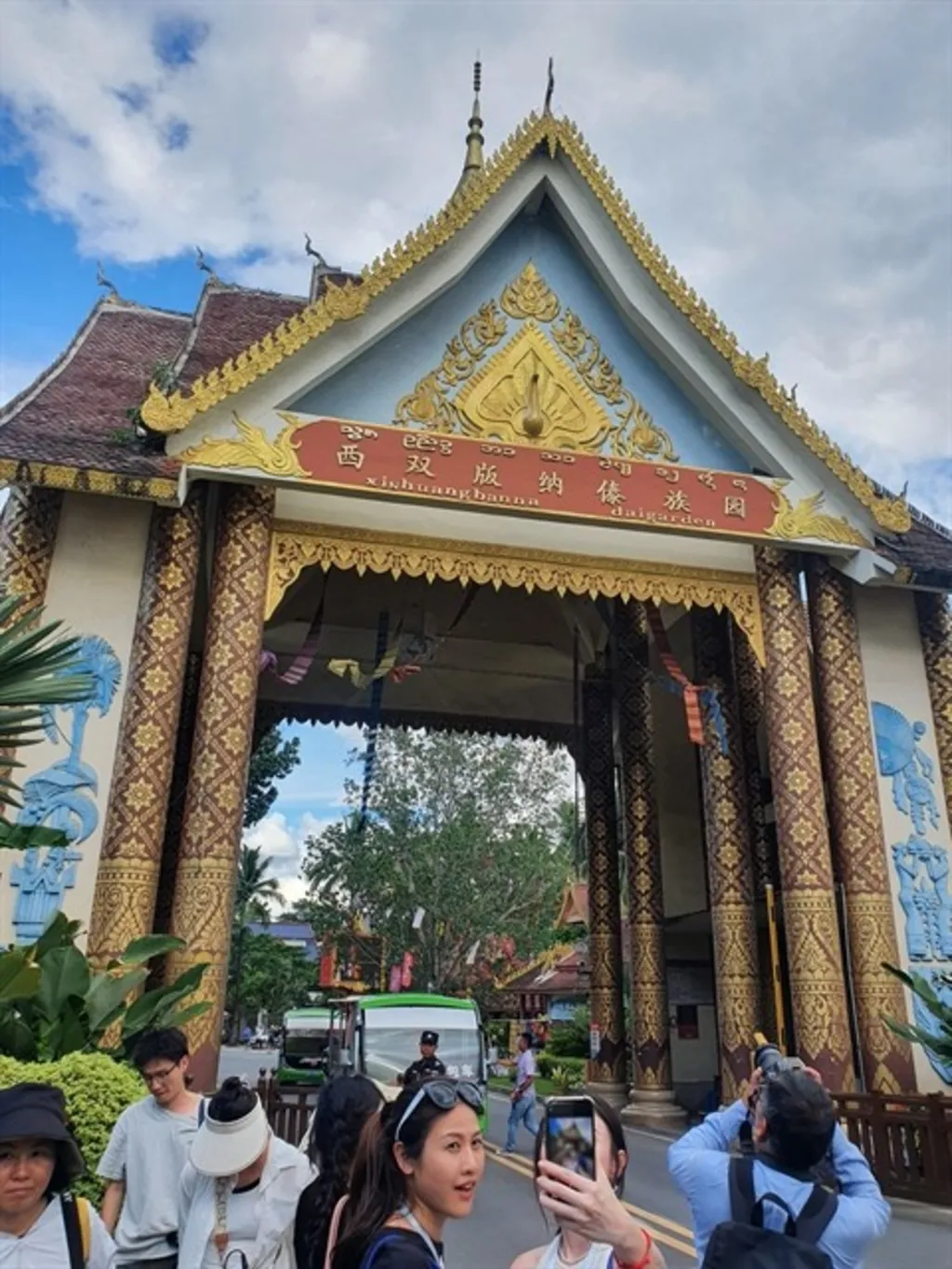 |
| GRAND ENTRANCE: Tourists take photos at the entrance of the Dai Ethnic Garden. VNS Photo Lương Hương |
The Dai Ethnic Garden is like a vivid open-air museum that showcases the unique culture and traditions of the Dai people. Covering 336 hectares, the park is home to five well-preserved Dai villages: Manjiang, Manchunman, Manzha, Manga, and Manting.
The park's 1,824 residents in 362 households live amidst a showcase of Dai history, art, religion, sports, architecture, customs, productive activities, and speciality tourism products.
Visitors can explore the ancient Manchunman Buddha Temple, view Dai intangible cultural heritage exhibits, enjoy folk activity exhibitions, and sample local snacks. A highlight is the daily "Happy Water-Splashing Festival", a folk performance that includes the splashing of water.
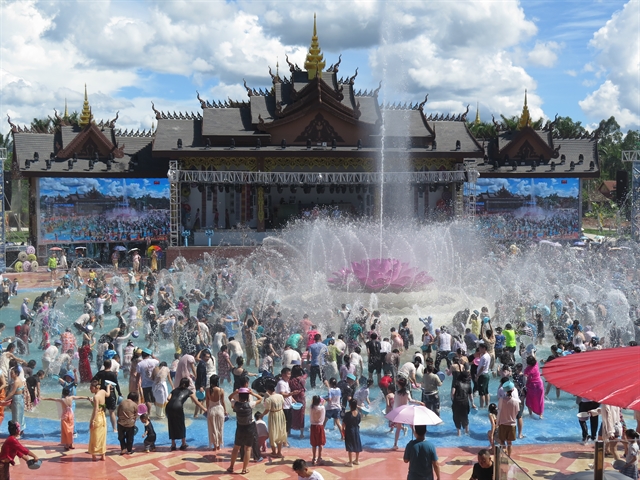 |
| FOUNTAIN: Visitors join the daily 'Happy Water-Splashing Festival'. VNS Photo Lương Hương |
The Water-Splashing Festival, a longstanding tradition of the Dai people, takes place during their New Year, around mid-June. People visit temples to offer blessings by pouring water and splashing water on one another to wash away troubles and bring good luck.
At the Dai Ethnic Garden, visitors can experience this tradition daily. They can join in the festivities by dancing to Dai folk music, renting plastic tubs and costumes, and participating in the joyous water-filled celebrations.
Jinghong Night Market
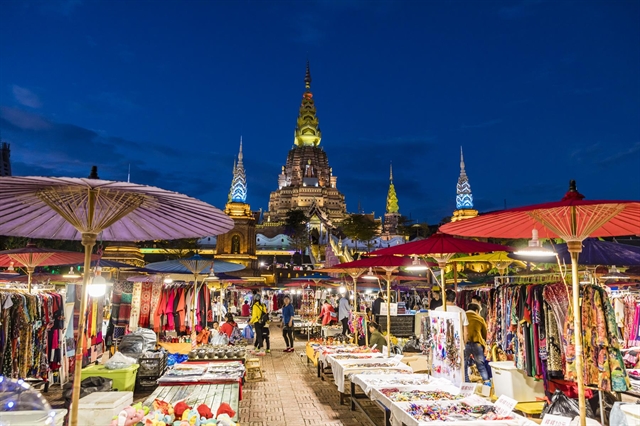 |
| A corner of Jinghong Night Market. Photo visityunnanchina.com |
Xishuangbanna is known not only for its vibrant daytime activities, but also for its lively night markets, which are rich in Thai cultural influences. One of the most popular night markets is in Jinghong, the capital city of Xishuangbanna. The market offers a feast for the senses, with local delicacies and specialities crafted by skilled chefs and vendors. A must-try dish is the specially prepared grilled beef jerky, known for its impressive flavour.
For the more adventurous, stalls selling fried insects like spiders, scorpions, and centipedes offer a unique culinary experience. For dessert, visitors can enjoy ice cream shaped like Xishuangbanna landmarks or freshly made watermelon and passion fruit juice.
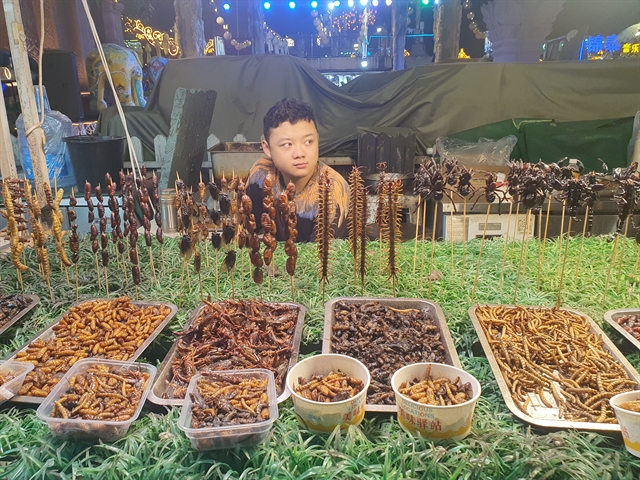 |
| TASTY GRUB: A stall sells fried insects like spiders, scorpions and centipedes at Jinghong Night Market. VNS Photo Lương Hương |
Beyond food, the night market is a hub of local handicrafts. I was captivated by the range of handloom textiles, intricate pottery, delicate silver jewellery, and charming souvenirs.
Interestingly, many young people at the Jinghong night market dress up as "princesses", wearing brightly coloured traditional Dai costumes adorned with embroidery, beadwork, and headdresses. The market offers costume rental and makeup services, allowing visitors to transform into princesses in minutes.
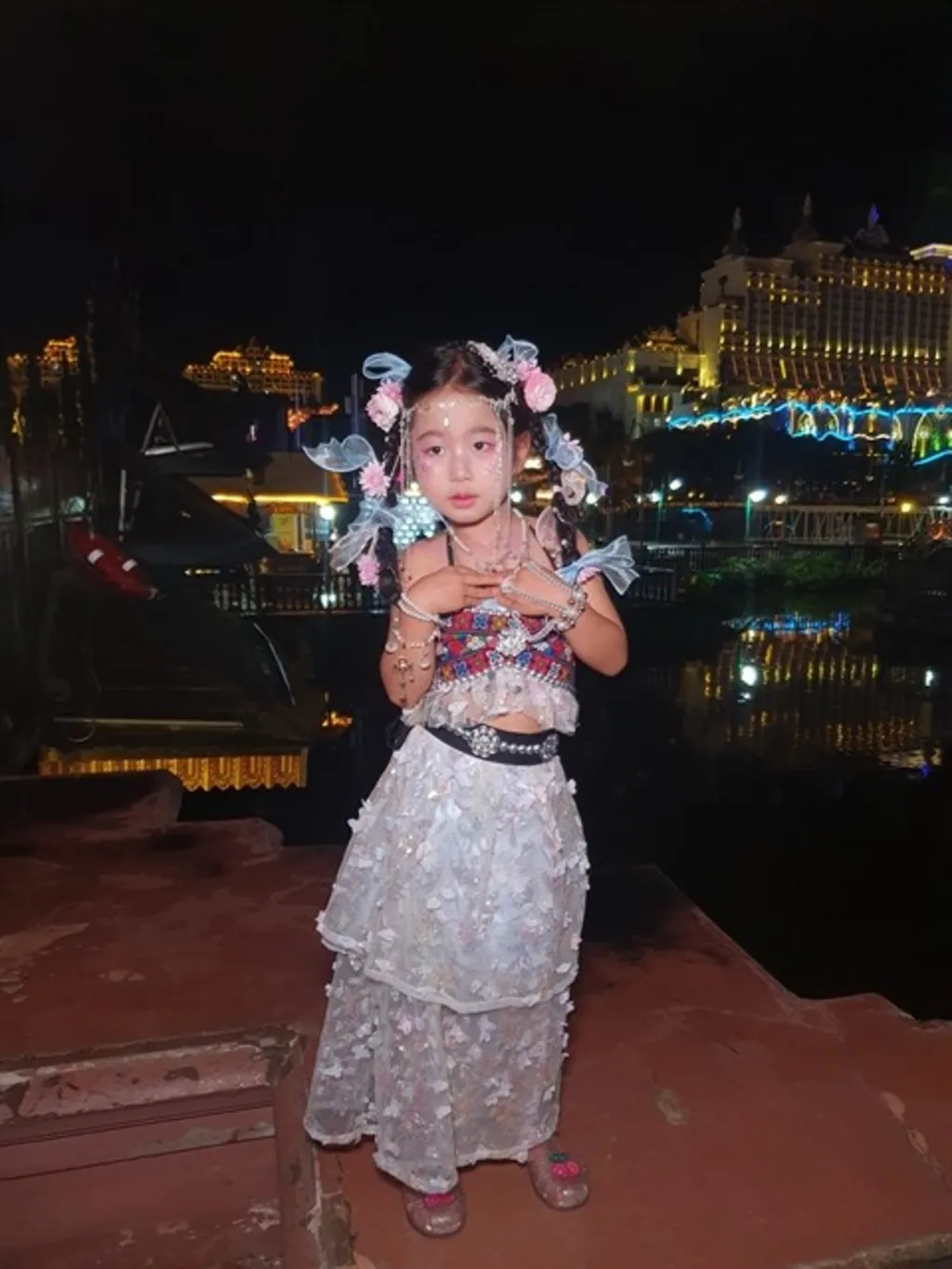 |
| CUTEY: A 'little princess' poses for a photo at Jinghong Night Market. VNS Photo Lương Hương |
A trip to Xishuangbanna offers a visual feast with its lush tropical landscapes, unique ethnic culture, and lively nightlife. It's a must-visit place for those seeking either a peaceful respite in nature or an exciting, immersive cultural experience. VNS